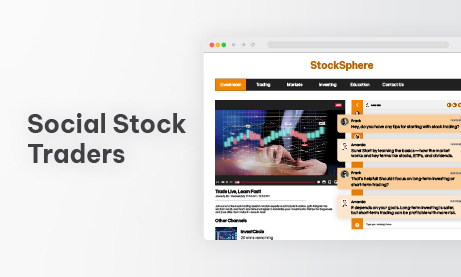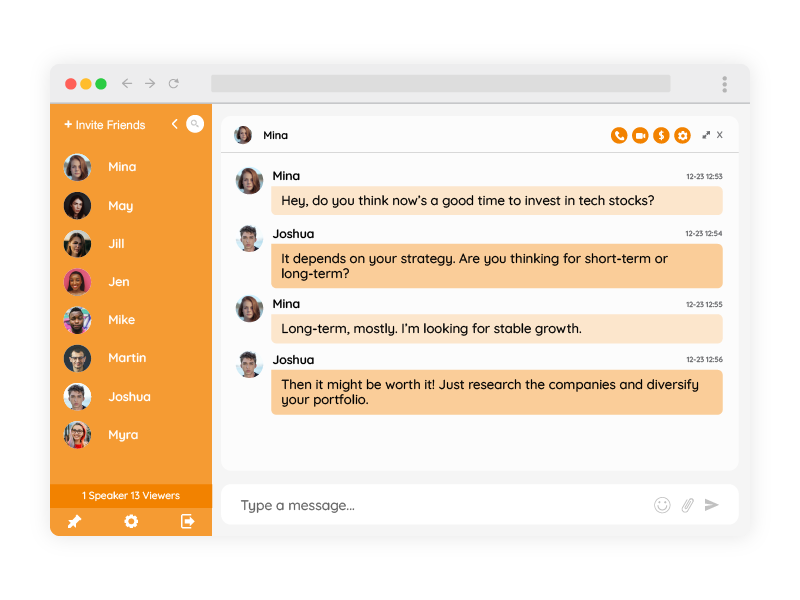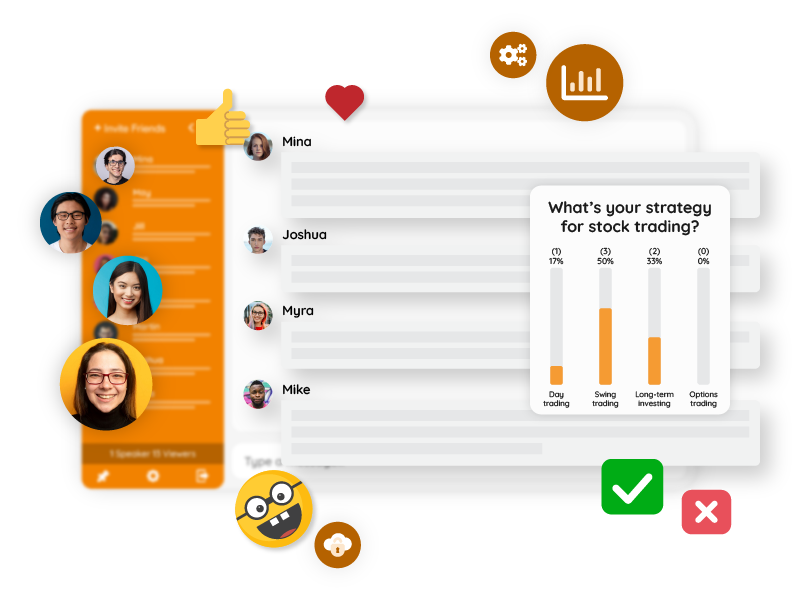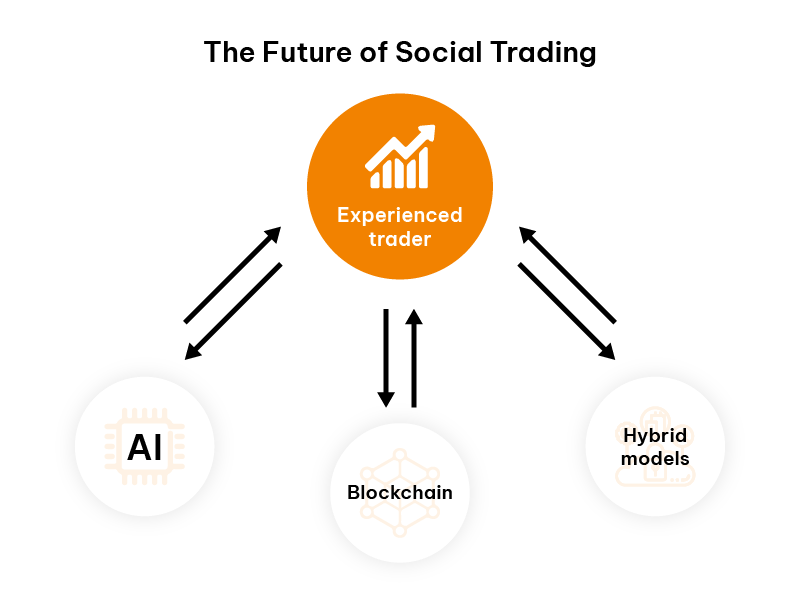Stock traders find themselves in a battle against the “trading machines”. While these machines excel at analyzing massive datasets and executing trades at lightning speed, they lack the one advantage humans hold: the power of collaboration and collective insight. This is where social stock traders step in, using chat rooms to level the playing field and sometimes even outsmart the machines.
Social stock traders leverage real-time communication tools to share insights, strategies, and updates, creating a dynamic and interactive way to approach trading. This article explores how chat rooms empower social stock traders to compete with algorithms, the tools they use, and the key strategies they employ.
Who Are Social Stock Traders?
Social stock traders are individuals or groups who harness the collective intelligence of a trading community to make more informed decisions. Unlike traditional traders who rely on isolated analysis or algorithmic models, social stock traders operate in collaborative ecosystems.
Key Characteristics of Social Stock Traders:
- Community-Driven: They work together in chat rooms, forums, or social media groups to exchange ideas and strategies.
- Real-Time Collaboration: Decisions are often made based on discussions, news sharing, and quick insights from other traders.
- Diverse Backgrounds: Social stock traders can range from seasoned professionals to retail investors with limited experience, united by their willingness to share and learn.
This human-centric approach allows them to adapt quickly to market changes, spot opportunities algorithms might overlook, and capitalize on collective wisdom.
The Role of Chat Rooms in Social Trading
Chat rooms have become the nerve center of social trading, providing a platform for traders to communicate, share strategies, and discuss market conditions in real-time. Platforms like Discord, Telegram, Slack, and even private WhatsApp groups host thriving communities of social stock traders.
Why Chat Rooms Are Effective for Social Trading:
- Real-Time Updates: Traders share breaking news, economic indicators, or emerging trends faster than traditional news outlets.
- Crowdsourced Insights: Diverse perspectives often lead to unique trading strategies that machines may not predict.
- Emotional Support: Trading can be stressful, and chat rooms offer a space for camaraderie, advice, and encouragement during volatile markets.
- Democratizing Information: By pooling resources, even retail traders gain access to high-level insights that were once exclusive to institutions.
How Social Stock Traders Beat the Machines
Algorithms excel at analyzing historical data, executing trades based on patterns, and reacting to pre-programmed triggers. However, they have limitations:
- They lack the ability to interpret nuanced market sentiment.
- They cannot predict human-driven events, like regulatory changes or geopolitical developments, without historical data to base predictions.
Traders exploit these weaknesses by leveraging their human intelligence, creativity, and adaptability in ways machines cannot replicate.
Key Strategies Used by Social Stock Traders:
- Sentiment Analysis Through Chat Discussions:
Chat rooms allow traders to gauge market sentiment in real time. Discussions about news, rumors, and personal opinions provide a qualitative edge that machines might miss. - Coordinated Trading:
Some social trading groups use chat rooms to synchronize actions, such as buying or selling specific assets, creating momentum that machines cannot counteract immediately. The infamous GameStop rally in early 2021 is a prime example. - Leveraging Breaking News:
While algorithms rely on predefined data feeds, social stock traders can quickly interpret breaking news, rumors, or insider tips shared in chat rooms and react faster than machines. - Adaptability:
Social stock traders constantly adjust their strategies based on new insights from discussions, whereas algorithms follow pre-set rules.
Tools and Platforms Empowering Social Stock Traders
Several platforms and tools have become staples for social stock traders to organize and execute their strategies.
- Discord and Telegram:
These platforms host large trading communities where users can discuss market trends, share charts, and post-trade setups.- Features: Real-time voice and text communication, sub-channels for different markets or strategies.
- Examples: Crypto trading groups on Telegram often exchange real-time updates during volatile sessions.
- Slack for Professional Traders:
Smaller, more focused groups often use Slack for its organized structure and enhanced privacy settings. - Custom Trading Bots in Chat Rooms:
Some social trading groups integrate bots to analyze market data and provide alerts. These bots complement human insights rather than replace them. - Dedicated Platforms like eToro:
eToro combines social networking with trading, allowing users to copy successful traders while engaging in community discussions.
Real-Life Examples of Social Trading Success
Social trading is not new. Here are some scenarios that happened in previous years that made a mark in the trading world.
1. The GameStop Saga
The GameStop phenomenon of early 2021 demonstrated the power of collective action driven by social stock traders. A subreddit group, r/WallStreetBets, coordinated buying activity to squeeze institutional short-sellers. This activity was mirrored in chat rooms across platforms, proving that organized social stock traders could disrupt even the most established financial players.
2. Crypto Pump-and-Dump Groups
In cryptocurrency markets, groups often coordinate “pumps” where they collectively buy an asset to drive its price up before selling at a profit. While controversial and often unethical, these strategies demonstrate how chat rooms can create market-moving momentum.
3. Forex Day Trading Groups
Forex trading communities use chat rooms to analyze currency pairs, share signals, and react quickly to geopolitical events. This real-time collaboration helps traders capitalize on short-term opportunities that machines may miss.
The Ethical and Regulatory Challenges
While social trading offers numerous benefits, it also raises ethical and regulatory concerns:
- Market Manipulation: Coordinated actions, such as pump-and-dump schemes, may violate market regulations.
- Misinformation Risks: Chat rooms can spread false information, leading to ill-informed decisions.
- Lack of Accountability: Anonymous platforms may foster behavior that harms the collective group.
To mitigate these risks, communities must establish guidelines, ensure transparency, and encourage ethical behavior among participants.
The Future of Social Trading
As technology continues to evolve, social trading is likely to grow in sophistication. Innovations such as artificial intelligence, blockchain technology, and more advanced trading platforms will further empower social stock traders. However, the essence of social trading—collaboration and collective intelligence—will remain its cornerstone.
Predictions for the Future:
- AI-Enhanced Social Trading: Chat rooms may integrate AI tools to analyze sentiment or provide actionable insights based on discussions.
- Blockchain Transparency: Decentralized platforms could ensure accountability and fairness in social trading practices.
- Hybrid Models: Platforms may combine algorithmic trading with human-driven social insights, creating a more balanced approach to markets.
Human Collaboration vs. Machine Precision
Social stock traders have shown that, despite the dominance of algorithms, human collaboration remains a powerful force in the financial markets. By using chat rooms, they create an environment where ideas flow freely, strategies are refined collectively, and the unpredictable nature of human behavior is leveraged to outsmart machines.
As the trading landscape continues to evolve, the interplay between human ingenuity and technological advancement will define the future of financial markets. Social stock traders, armed with their chat rooms and collective intelligence, are proof that humans can still hold their own in the age of machines.





